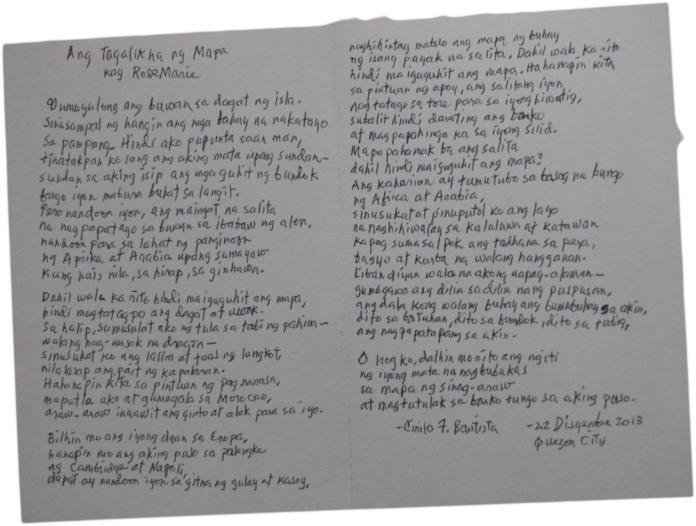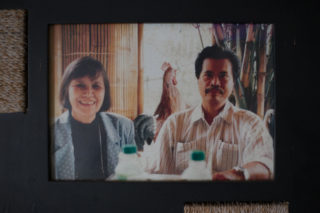
NATIONAL Artist for Literature Cirilo Bautista, who passed away May 6 after a lingering illness, was acclaimed for reinventing epic poetry and the modern retelling in verse of Philippine history, but if there was epic heroism in his life, it was unassuming and humble.
His humility was mentioned in the text of his official proclamation as National Artist in 2014 by President Benigno C. Aquino III.
“Ultimately, Bautista is a shepherd who in his little and humble ways, safeguards the national imagination and nurtures aesthetic sensibility of the Filipino Soul,” Proclamation 809 reads. “For Bautista who spent his life writing and teaching, the Filipino poet, true to his artistic legacy, carries the Archipelago forever in his heart.”
Bautista had been suffering from muscle dystrophy, a congenital disease, and earlier this year, was confined at the Philippine Heart Center. The condition later affected his lungs and the end came on May 6.
He was 76.
Cliché as it may sound, “from humble beginnings come great things” is still a felicitous truism to characterize the life of Bautista. He can be described as someone who went through fire and water before becoming one of the country’s literary titans.
On the ninth of July 1941, Bautista was born to Claro Cruz Bautista and Victoria Manuel Francisco. His Latin name meant “lord” or “master,” befitting his later renown as a master of the pen.
Growing up in Balic-Balic, Sampaloc in Manila, Bautista sold newspapers and cleaned the soiled shoes of passersby to help his family earn extra income. His father was a foreman in a cigarette factory, while his mother did domestic chores for their neighbors. His sister worked as a wrapper of sweets in a confectionery shop, while his brother served as a draftsman to an architect.
Despite the family’s rather dire economic situation, Bautista was able to prove that poverty was no hindrance to a determined person. He excelled in school.
He finished his primary education at the Legarda Elementary School in 1954, getting a first honorable mention, and his secondary education as valedictorian at Victorino Mapa High School in 1958.
Being an honor student, he was granted an academic scholarship by the University. His stint in UST, during which he became staffer and later the literary editor of the Varsitarian, became his apprenticeship as a writer.
In 1963, he graduated magna cum laude with a bachelor’s degree in English from the old UST College of Liberal Arts.
Bautista taught at the St. Louis University and while there, took up his master’s in Literature that he finished as magna cum laude in 1968. He was awarded an important fellowship at the University of Iowa’s prestigious International Writing Program from 1968 to 1969.
He later taught at De La Salle University where he obtained a doctorate in Language and Literature in 1991.
The poet’s muse
While taking his master’s degree at SLU in Baguio, Bautista met Rosemarie who became his girlfriend and later on, his wife. Rosemarie was teaching in SLU, and one time, had to be the substitute teacher for her friend, who also happened to be the professor of Bautista.
Rosemarie, now 79, told the Varsitarian of her first encounter with Bautista.
“One day, I was walking on Session Road and I stopped by a cafe where I usually took my snack, and Bautista and a friend were there. That’s the first time we talked,” Rosemarie said. “Then he asked me if he could visit me, so he did, and then he started writing poems for me—very nice simple poems.”
“From that time, we really became good friends. Afterwards, I told him I was enjoying being his friend, and he said, ‘I’m not interested in being your friend.’ So, he took our relationship to another level.”
Rosemarie said Bautista’s brilliance, sincerity and love for literature were what she liked about him.
“I love literature and that is what attracted me to him—his poems and his letters—aside from the fact that he was a simple, honest and real human being,” she said. “There was nothing fake about him.”
Rosemarie decided to introduce Bautista to his parents, but her mother did not approve.
“My mother likes good-looking guys, like most persons do. He (Bautista) was a very poor man and that’s why my parents could not imagine how I could have a family with him. My parents were very practical as most parents are,” she said.
Bautista loved Rosemarie and asked her to be his bride. When Rosemarie agreed, Cirilo placed in her finger a ring that he borrowed from his friend.
“Anyway, against (my parents’) wishes, I got married,” she said.
Rosemarie bore Bautista a son and two daughters: Nikos, Maria and Laura.
Bautista considered “having wonderful children” as his most significant accomplishment, Rosemarie said.
“He knows how to love greatly and showed it greatly in every way—in his works and in his gestures. He is a very loving man,” she said. “He has a bad temper at times, particularly when he cannot write because of noise, but when we had young children, their noise did not bother him.”
Bautista was a teacher all throughout his active life in the institutions that educated him: SLU from 1963 to 1968, UST from 1969 to 1970, and DLSU-Manila from 1970 to 2005.
He was an exchange professor in Waseda University in Japan in 1985 and Ohio University in the United States in 1989. Bautista was also the first recipient of a British Council fellowship as a creative writer at Trinity College in Cambridge in 1987.
Aside from teaching, he was also a co-founding member of the Philippine Literary Arts Council and a member of major literary writers’ organizations in the country such as Manila Critics Circle, Philippine Center of International PEN (Poets, Playwrights, Essayist and Novelist) and the Philippine Writers Academy.
Bautista also served as a columnist and literary editor of the Philippine Panorama, the Sunday supplement of the Manila Bulletin. He was an associate of the Bienvenido N. Santos Creative Writing Center and a senior associate of the then UST Center for Creative Writing and Studies.
Bautista’s first book, “The Cave and Other Poems,” bagged the second prize for poetry at the prestigious Carlos Palanca Memorial Awards for Literature in 1968. His next collections won the Palanca first prize: “The Archipelago” (1971), “Charts” (1973), “Telex Moon” (1975) and “Crossworks” (1979).
Also winning first prizes were the short story, “The Ritual (1971),” and the essay, “Philippine Poetics: The Past Eight Years” (1981).
In 1995, Bautista became the first Palanca Hall of Famer for winning at least five first-prizes. Three years later, the third and last part of his Trilogy of Saint Lazarus, Sunlight on Broken Stones, won the Philippine Centennial Literary Prize for poetry.
Published in 1999, “Sunlight” won the National Book Award by the Manila Critics Circle and the Gintong Aklat Award, given by the National Book Development Association of the Philippines.
Bautista not only excelled in the English language; he was also hailed by the Komisyon ng Wikang Filipino as the Makata ng Taon in 1993 for his poem, “Ulat Buhat Sa Bulkan.”
Bautista’s other poetry collections are “Boneyard Breaking” (1992), “Sugat ng Salita” (1985), “Kirot ng Kataga” (1995) and “Believe and Betray: New and Collected Poems” (2006) and his novel “Galaw ng Asoge” (USTPH, 2004).
Cirilo’s last book, “In Many Ways: Poems 2012–2016,” was launched at DLSU last January 30.
On April 14, 2014, Cirilo Bautista was proclaimed National Artist for Literature, the highest state honor bestowed on a Filipino who has made significant contributions to the Philippine literature.
He was survived by his children and his wife Rosemarie, who described the poet’s death as “peaceful and without struggle.”
“I held his hands and told him how much I love him, and he gently passed away,” she said. “He died as quietly as he wrote.”













